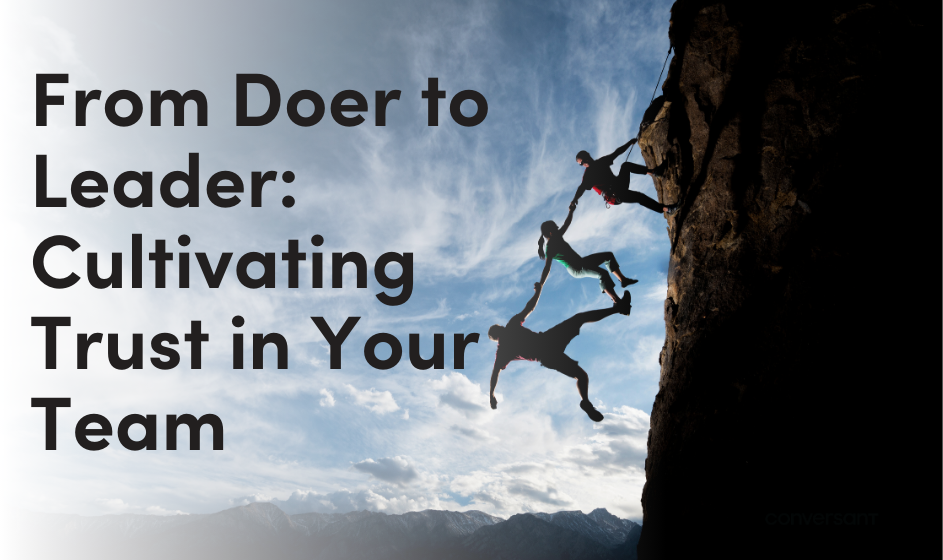An experience I had a few weeks ago was a catalyst for a revelation: it is worth my time to invest in how I am perceived as a leader.
I’ve always operated from the mindset that my accomplishments should speak for themselves, that people should get out of the way when I’m doing good work and that little slip-ups are fully pardonable for the sake of the cause. And what finally sunk in for me recently is that this only works if there is a strong foundation of trust and relationship.
I realized that working to be more aware of how I am perceived and received is not a waste of my time, but the opposite: I will create more value with less effort by fostering closer relationships with people. Having my ideas reality-checked by my colleagues is a gift, not an impediment, and by inviting and encouraging their feedback I co-create an environment of real-time adjustment. And putting in the work and the time to do this now builds my muscles for working with empathy, compassion, curiosity, and collaboration going forward.
So, to build my leadership brand up further, I’m focusing on three things at the moment:
- I am actively seeking out feedback in order to create a culture where people can share honestly with me.
- I am practicing deeper curiosity as a way of living in the truth that my story is not the only story.
- And I’m working to grow awareness around my physical presence and the effect it has on others.
Seek out Feedback
The catalyst for my reinvigorated commitment to living my leadership style was watching Eric Schmidt, the Executive Chairman of Google, talking about what it means to be a good leader. He advised, among other things, establishing a culture where it’s not only acceptable but expected to be the one bringing up bad news. If you are aware of an issue, you need to disclose it. As Eric Schmidt put it, “Culture has to allow for a crisis in the morning to be fixed in the afternoon.” Mistakes happen, and the culture of an organization – which starts with the leaders in the organization – must allow for mistakes to be identified and addressed within a matter of hours. To cultivate this culture of feedback, I’m asking at least three coworkers for feedback every week, just as a five-minute conversation.
Practice Deep Curiosity
A colleague and mentor, Robin Anselmi, gently pointed out to me recently that I tend to lead with certainty rather than curiosity. She recommended I ask more questions to help others understand that my input is meant as a value add and is up for debate. I asked her if I was at risk of coming off as mousy or uncertain if I didn’t assert myself adamantly enough, something I’m often conscious of wanting to avoid as a younger person and especially as a woman. After laughing for a little while, Robin said no, she didn’t think I was at risk of that. In fact, by not asking more questions and practicing authentic curiosity, I’m at risk of stunting my growth and development. In the words of Carolyn Slaski, Americas Vice Chair of Talent at EY, “A curious leader builds trust, inspires connection and develops deep engagement with their teams.” And, as an additional value add, “leading with questions works because it generates a conversation where multiple voices are heard and diverse perspectives are represented in the final outcome.” We are smarter together and diversity of thought improves the quality of our work together exponentially.
Awareness of the Physical
Finally, I’m focusing right now on how I show up physically to a room. Doing things like fidgeting, doodling, and fiddling with my hair can potentially detract from how seriously people take me and from how engaged they perceive me to be. Even if those little ticks in some ways help me focus, they may occur to colleagues and clients as indicators of distraction. I routinely ask a colleague for feedback before and/or after important meetings on how I showed up in the room. I’ve had all sorts of great, actionable feedback and, by approaching coworkers and asking them for help with a specific thing, I’ve also started fostering the environment of feedback I’m working on! #WinWin
~
I have moved from the cognitive level of leadership to the active engagement of improving my impact. Building my leadership brand to be patient, receptive, even-keeled, and open-to-feedback today means that, in 20 years, I will be the leader of a team who feels confident coming to me with problems so we can address them together as a team in a timely manner, minimizing their impact on the company. Being compassionate and curious today means that, in 20 years, new, young leaders will approach me with ideas, so we can collaborate on creating new and surprising results. And being aware of my physical presence today means that, in 20 years, I will have a natural gravitas in my demeanor.
It is always timely to invest in developing my leadership brand. By acting like a better leader, I become a better leader.




